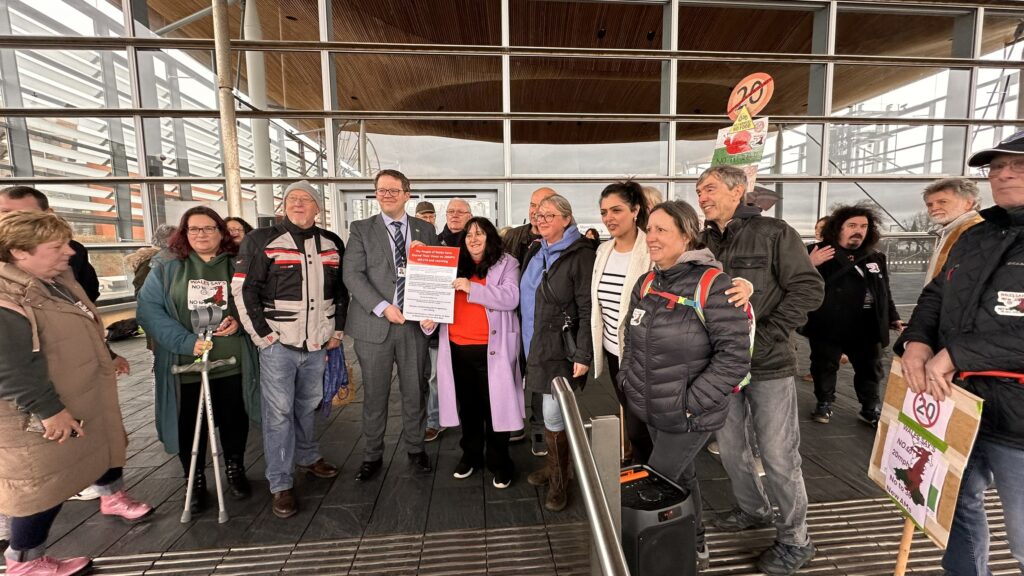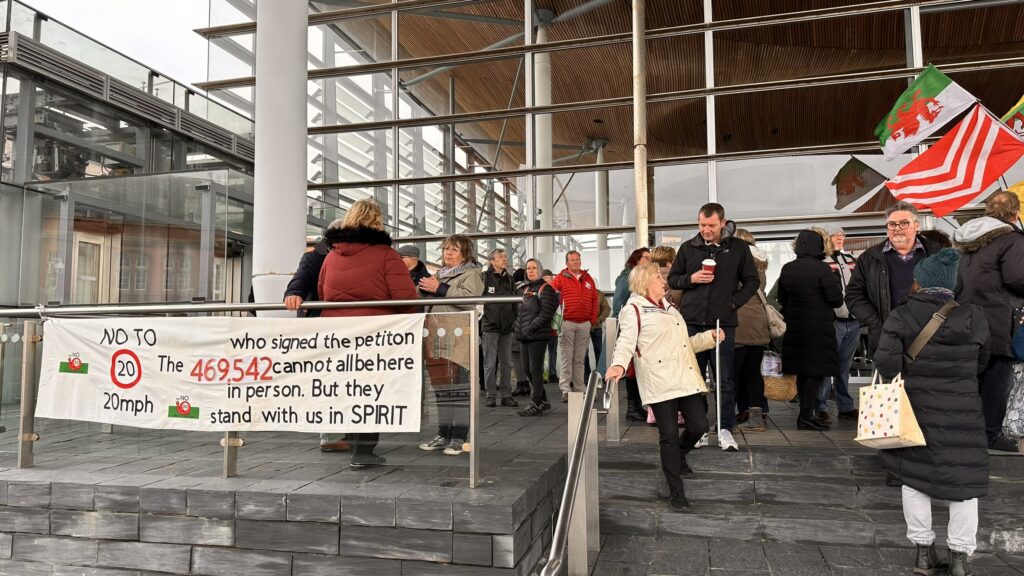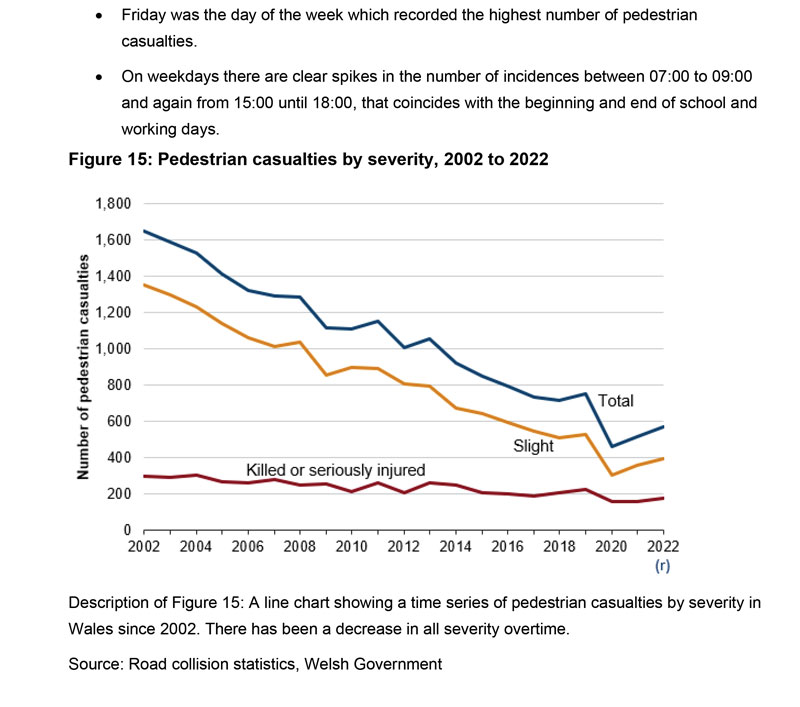Vehicle Convoy and Protest on the Senedd Steps as 20mph Petition Goes into Welsh Parliament – But Is The Minister Watering Down The Research?

Written by Lisa Baker LLB
Heads up – I am not remotely independent on the 20mph campaign – I am the Petitioner’s wife and for this reason, I have largely sat on the sidelines and let other journalists do the reporting on this issue. However, now the petition has closed, I feel it’s fair for me to have my open say on my own news site about this unpopular policy which has seen strong objections from drivers across Wales.

Yesterday my publicity-shy husband and I joined regular protestors in a Go-Slow Convoy Protest and later on the steps of the Senedd, where Mark, myself and a group representative were invited to meet with Transport Minister Lee Waters, who has already announced his intention to leave office when the next First Minister is appointed.
Yesterday’s protests drew more supporters than normal in a friendly and united stand against a policy as unpopular as the poll tax.
Waters: “It’s not a blanket 20mph”

Mr. Waters explained to us that the widespread 20mph (which he strongly denied was a ‘blanket’ policy) would be more cost efficient than on a case by case basis, due to the amount of work involved so the Government has instead put the onus on local councils to exempt individual roads.
It was an interesting and at times tense meeting. Mr. Waters claimed that councils could have exempted far more main roads under their existing policy and were, in his words, ‘simply risk averse’ and could, in his opinion, have made more sensible decisions on a local basis. He agreed that the 20mph on an industrial estate in Bridgend was, in his words ‘ridiculous’ and denied that their guidance and criteria had made it difficult for councils to make local decisions on a case by case basis.
When challenged on the lack of a mandate from the public for default 20mph, Mr. Waters claimed the Welsh Government had twice received a mandate from cross-party votes within the Senedd.
The group and the minister were unlikely to see eye to eye, however things got heated when a group representative pointed out that the Senedd’s own Integrated Impact Assessment 2022 showed that consultation groups rejected the 20mph proposals but the Minister went ahead with the policy anyway – and that within these documents, the policy had in fact been referred to by Lee Waters himself as a ‘Blanket 20mph‘.
Mr. Waters stated to the group that the widespread 20mph was required to “re-educate Welsh drivers” to normalise driving more slowly as there had been no real change to the number of pedestrian casualties in the previous ten years, which he claimed was the reason for introducing the policy.
Following the meeting, I decided to examine Mr. Waters’ claims for accuracy.
Road Collision Statistics
The Welsh Government’s own Road Collision Statistics show a consistent fall in pedestrian casualties since 1979 in a trend that appears to have continued over the past 10 years. There is a significant drop during lockdown periods, as you would expect, but the numbers of people killed or seriously injured but overall, (Covid drop flattened) the trend shows a large overall fall.
The drop in the rate of pedestrians killed or seriously injured is less significant than the overall fall in pedestrian casualties – but the graph still shows a fall except for the post-covid rebound which you would expect. I will allow readers to form their own conclusions as to Mr’ Waters’ assertions that there is a ‘flatline’ in Wales:

Reducing fatalities and serious injuries
It is fair to say that there is less of a drop when it comes to the numbers of pedestrians seriously injured or killed, however with clear spikes in the rate of serious injuries between 7-9am and 3-6pm, there is limited evidence to suggest changes during this time of day would have the most impact on this.
As it stands, professional delivery drivers will receive fines for exceeding 20mph at 2am.
Judge for yourself if this research supports this:

The group suggested that road safety education, no longer taught in schools, would be helpful. Mr. Waters did not really comment on this.
“This is not Climate Related”
However, other research documents could be more telling about the reasons behind the speed change. In the Integrated Impact Assessment 2022, Mr. Waters, (a former Director of sustainable cycling charity Sustrans which received £3m in Welsh Government funding), also mentions a target of a planned 40% reduction in car use by 2040 and mentions pushing drivers towards walking and cycling instead.
We did not raise this in our meeting, however Waters strongly denied the move was climate-related.
Mr. Waters also strongly disputed the group’s assertion that the £60m spent by the Welsh Government on cycle paths was a ‘waste of money because nobody uses them’.
I can only speak as I find and have seen one person on the cycle paths between Cornelly and Port Talbot in almost a year of travelling three times a week – and at least three cyclists a day on the road and not the cycle paths during the same timeframe.
The Minister told us the paths were used, but failed to provide evidence of this.
Minister Agreed 20mph is unpopular in Wales
Mr. Waters did acknowledge that the default (not ‘blanket!) 20mph was not popular with Welsh constituents.
Nobody can argue with the statistics on that – a Daily Express poll saw a whopping 97% of people calling for the 20mph to be scrapped. The Petition closed yesterday with a record-breaking 469,570 signatures, and given the comments on many of the anti-20mph groups set up on Facebook, anger and resentment continues to grow.
Mr. Waters maintained that his research (which shows some degree of compliance) shows people are accepting and getting used to the speed change, and assured us if the policy does not reduce deaths and serious fatalities they would change it. The group maintain that compliance with the law and acceptance are NOT the same thing.
As we parted company, Mr. Waters said that “There are three million people in Wales so 469,570 is not a majority.”
As I pointed out, it’s more people than voted Labour at the last Senedd elections.





